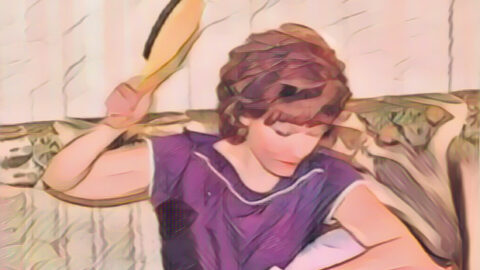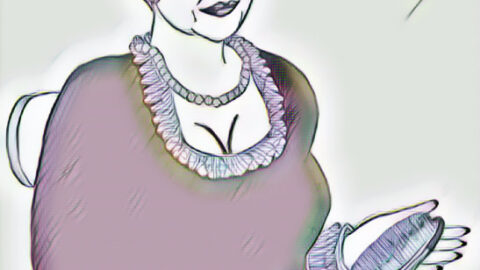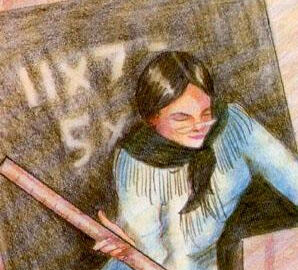During the war in the 1940s, I was sent away from home to live with my Aunt Jennifer in the North of England for safety.
I remember the day I left home vividly. My mother hugged me tightly, her eyes brimming with tears, while my father tried to reassure me with a brave smile. The train journey north felt endless, and I stared out the window, wondering what my new life would be like.
At that time, every household was required by law to take in at least one evacuee. Aunt Jennifer, however, ended up with three of us instead of just one.
The other two evacuees were my cousins, Sarah and Michael. Sarah was quiet and shy, always clutching her favorite doll, while Michael was adventurous and often got us into trouble. We stuck together, finding comfort in each other’s company.
When we arrived, Aunt Jennifer—who wasn’t really our aunt—insisted that we call her ‘Aunt’ from the very beginning.
Back then, it was considered respectful and polite for children to address adults as ‘Aunty.’
The last thing Aunt Jennifer wanted was to be lumbered with evacuees from London.
During the war, there was a real stigma attached to not being able to serve in active duty. For Aunt Jennifer, who was only in her early thirties, this was especially hard. Many people judged her, not understanding the reasons behind her situation.
Aunt Jennifer was deeply upset after being turned down for military service. The rejection left her bitter and resentful, and she became almost unbearable to be around—strict, short-tempered, and difficult with everyone.
Aunt Jennifer had always wanted to serve her country, but when she applied to join the Wrens for active military service, she was turned down because she was deaf. The rejection left her disappointed, but she remained determined and strong.
Aunt Jennifer Palin stood tall and stern, her hair pulled back tightly beneath a plain headscarf. She wore a practical, no-nonsense wartime utility dress in dark navy blue, with large patch pockets and sturdy brown shoes. Her outfit was completed by thick stockings and a simple, well-worn overcoat, showing she valued function over fashion. Aunt Jennifer’s appearance reflected the strict, old-fashioned values she carried from the war years.
As soon as we stepped into Aunt Jennifer’s house, she made her rules very clear and warned us that there would be serious consequences if we misbehaved.
Aunt Jennifer’s house was old and drafty, with creaking floorboards and the smell of coal lingering in the air. The walls were lined with faded photographs and heavy curtains, making the rooms feel dark and somber. It was nothing like the warm, bustling home I had left behind.
Aunt Jennifer explained that in her house, a ‘jolly good smacked bottom’ meant being sent to her bedroom, lying face down on the bed, and receiving several firm smacks with her strap. She wanted us to know she was serious about discipline.
We tried our best to avoid Aunt Jennifer’s strap, but it was only a matter of time before someone got into trouble.
We lived in constant fear of Aunt Jennifer’s strap. Even the slightest mistake—spilling milk or speaking out of turn—could earn a stern warning. At night, we whispered to each other under the covers, promising to be on our best behavior.
One warm summer day, while Aunt Jennifer was out, we played in the garden wearing our Sunday best. Not used to such strict rules, we got carried away, roughhousing and shouting. Soon, we ended up rolling in the flower bed and accidentally broke several plants.
When Aunt Jennifer returned and saw the devastation in the garden, her face turned red with anger. She marched us straight to her bedroom, her footsteps echoing ominously on the wooden floor. Our hearts pounded as we clung to each other, trembling and in tears, knowing what was about to happen. The room felt cold and unforgiving, the heavy curtains drawn tight. We could see the dreaded strap laid out on the bed, its surface worn smooth from use.
Aunt Jennifer entered, her expression stern and unyielding. She ordered all three of us to lie face down on the bed, bottoms up, our hands gripping the scratchy blanket. I was in the middle, holding my cousins’ hands tightly. We all pleaded for mercy, our voices shaking, but Aunt Jennifer was unmoved. She rolled up her sleeves, took a firm grip on the strap, and warned us to stay still or it would be worse.
Then the punishment began. The first smack of the leather strap landed with a sharp, echoing crack, sending a jolt of pain through my body. Each stroke stung fiercely, leaving a burning line across my behind. We wriggled and kicked, but Aunt Jennifer held us down, delivering smack after smack in quick succession. The sound of the strap landing down on our bottoms filled the room, mingling with our cries and desperate pleas. Tears streamed down our faces as the pain grew unbearable, our bottoms throbbing and red. By the end, we were sobbing uncontrollably, clinging to each other for comfort, our bodies shaking from the ordeal. It was hard to sit down for supper that night, the soreness a constant reminder of Aunt Jennifer’s discipline.
Afterwards, we sat in silence, nursing our sorebottoms and wiping away tears. The room was heavy with the scent of leather and the echo of our cries. Aunt Jennifer didn’t say a word, but her stern expression made it clear she expected better from us. That night, I lay awake, the pain still lingering, missing my parents and wishing for the war to end.






























































